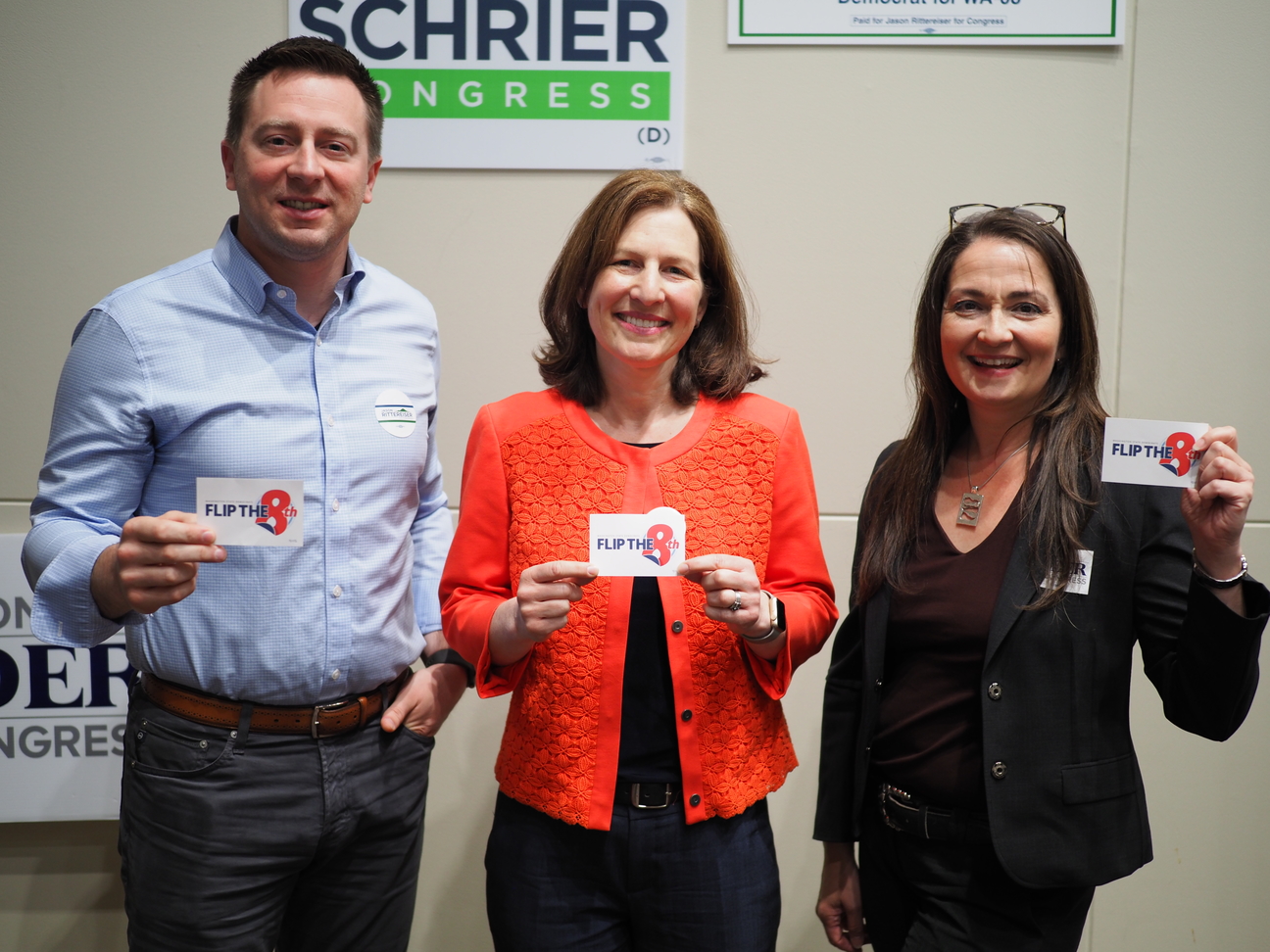Yesterday evening, the Kittitas County Democrats hosted a debate between the Democratic candidates hoping to represent the 8th Congressional District in the U.S. House at the Hal Holmes Community Center in Ellensburg. The debate once again brought together Shannon Hader, Jason Rittereiser, and Kim Schrier.
Rich Smith, staff writer for The Stranger, moderated the event.
The principal topics were healthcare, immigration, and strategies for defeating Republican Dino Rossi in the general election.
The debate utilized an intriguing format. Each candidate had five minutes to address each of the issues. When not presenting, the other two candidates were permitted to make two requests for information. The presenting candidate was then expected to address at least one of those requests.
Requests for information, however, were used very sparingly by the candidates. There was little attacking or disagreement among the three contenders, who mainly used the event as an forum to further communicate their qualifications and visions.
The debate started off with a discussion on healthcare. All three candidates affirmed their commitment to working towards accessible, quality healthcare for all.
The central point of contention during the healthcare portion of the debate was the candidates’ support (or lack thereof) for H.R. 676, a bill introduced by John Conyers that seeks to expands Medicare to cover every American.
Jason Rittereiser, a vocal supporter of H.R. 676, held the bill in front of him and detailed his support. He used requests for information to ask both Shannon Hader and Kim Schrier whether they would cosponsor the bill in Congress.
Hader said that while there were many positive aspects to the bill, she would not necessarily cosponsor the current iteration of it in Congress because it could eliminate the Indian Health Service without tribal approval.
Hader focused her presentation addressing the importance of critical access hospitals and the need to preserve and support healthcare in rural areas.
Hader specifically mentioned Kittitas Valley Hospital and her commitment to preserving public payments to rural hospitals and expanding Medicare, both of which will help to make rural healthcare sustainable.
Schrier was also reluctant to commit to cosponsoring H.R. 676 as currently written. She said she’s concerned that veterans would end up getting worse care under H.R. 676 and that healthcare agreements previously negotiated by unions on behalf of their workers could be negatively affected.
Schrier also discussed her comprehensive healthcare proposal that she rolled out earlier this month. Her plan includes expanding Medicare through an immediate public option, allowing the federal government to negotiate drug prices, and improving rural access to healthcare.
The second issue addressed by the candidates was immigration.
There was little that differentiated the candidate’s views. All three stressed the need for comprehensive immigration reform, the need for a clean Deferred Action For Childhood Arrivals bill, the importance of immigration to the 8th District’s economy, and the moral atrocities of family separation and Trump’s immigration directives.
Moderator Rich Smith chimed in and asked whether the candidates support Congresswoman Jayapal’s bill to establish a task force to dismantle ICE within a year. All three were unanimously against this idea, saying that the problem was not with ICE but with the directives handed down to ICE from the White House.
One of the most important questions for Democrats in the Top Two election is who has the best shot to beat Republican candidate Dino Rossi in the general election. The Democratic contenders each attempted to answer this question in the final segment of the debate, making the case for their candidacies.
Schrier argued that she has been fighting against Dino Rossi for the longest amount of time and has built the campaign needed to defeat him. She noted her campaign has raised more from individuals than any other candidate in the race.
Hader cited her track record of getting things done within the federal government as what would propel her to victory over Rossi. Hader served as director of the Division of Global HIV & TB at the Centers for Disease Control and Prevention.
Hader also cited her grassroots support. She has received endorsements from every single Democratic legislative district organization that has endorsed in the race. Twelve out of fifteen of these have been sole endorsements.
Finally, Rittereiser, born and raised in Ellensburg, argued his connection to Eastern Washington will help him to become the first Democrat to win a congressional election in the 8th. “There is an urban and rural divide that I am uniquely situated to unite,” Rittereiser said. He also argued that his legal background will help ensure that the Trump regime is subjected to the tough oversight it deserves.
All three candidates ended the debate by stressing the importance of the contest for flipping the House majority. The candidates urged all watching to enthusiastically cast their vote and make sure other Washingtonians cast theirs.
Ballots for the August Top Two election were mailed out this week and have already arrived for some voters. Voters must return them to a drop box or post office by August 7th, 2018. For the first time, no postage will be necessary to return the ballots through U.S. Mail, as all return envelopes include prepaid postage.

